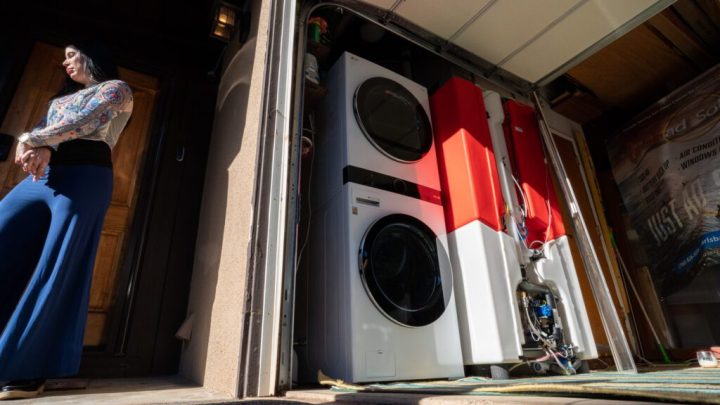
Some climate-conscious homeowners are embracing at-home water reuse
Some climate-conscious homeowners are embracing at-home water reuse

For years, Justin and Mindy Fox have been trying to make their water use more sustainable.
“I think every day that I put my son in the bath that I’ve wasted that water,” Justin said. “It drives me nuts.”
The Foxes live in Carlsbad, California, within sight of the beach. Their garage has piles of stuff with surfboards on top, and on one side, the Foxes show off their newest purchase: a water reuse machine.

This machine, made by the European company Hydraloop, will clean some of the water they use inside the house, such as in the laundry and the shower. That lightly contaminated water is collectively called greywater. The machine won’t make it clean enough to drink, but the Foxes will be able to reuse the water outside on their lawn, to top off their swimming pool and to flush the toilet.
Justin said he’s primarily motivated to be a more responsible steward of the environment, but also expects it will save them money on their monthly water bill, and he’s imagining how nice it’ll be to have this set up the next time California tightens restrictions on watering.
He’s so confident that even before he installed his own water reuse machine, he decided to make it an option for customers of his business, Carlsbad Solar, which installs solar panels. He bought a whole shipping container’s worth of Hydraloop water recycling units to sell to homeowners in California and Colorado.

Consumers who want to make their houses more climate-friendly have put solar panels on the roof, or electrified their appliances and perhaps even installed batteries to store solar power they can reuse at home. But water scarcity is also a climate problem, particularly in the American Southwest, where residents are being asked to conserve. That has motivated some homeowners to invest in reusing their water, and to try to get their neighbors to do it, too.
But homeowners don’t have to invest in a machine to reuse greywater in their yards. Laura Allen built her system in Oregon mostly from off-the-shelf parts. She co-founded the nonprofit Greywater Action, which educates people to reuse water at home.
“Every time there’s a drought, there’s a peak in interest,” she said.
With that, new companies emerge to offer plug-and-play greywater cleaning machines, though Allen says, so far, they haven’t been able to get enough customers to buy in to be successful.
“So these companies have really come and gone a lot in the U.S. over the last 20 years or so,” she said.
The Hydraloop machine the Foxes bought costs about $5,500, not including installation, according to a company spokesperson. The price is one reason some conservation experts aren’t sure greywater reuse will catch on house by house — whether it’s a machine or a do-it-yourself set-up.
“There’s going to be a certain kind of person that’s going to get really excited about greywater,” said Katie Spahr, who works on reuse for Denver’s water utility. “But I think for the average homeowner, I don’t know if they want another appliance in their house they have to maintain.”
She draws a comparison to rain barrels, pointing out that not many people make the effort to collect their rainwater and use it for watering in the yard.
Like some other Southwestern cities, Denver Water has pursued big, citywide wastewater recycling, where it can control the quality of the water and reuse more of it than a single house can.
“Especially as a utility that takes water from another river basin, from the Colorado River Basin,” Spahr said, “being able to recycle water at that larger scale is critically important for us.”

Spahr said individual homeowners who want to help in the water crisis may be better off getting rid of grass, or putting a smart meter in to monitor their water use in real time. But a lot of cities don’t have citywide wastewater recycling, and even in those that do, some homeowners want to take things into their own hands, like the Foxes.
Justin Fox predicts water reuse systems will someday be as popular as solar panels or electric cars — and as necessary, to help people climate-proof their own lives.
This story comes from the podcast Parched, about how people can live in the West as it dries out.
There’s a lot happening in the world. Through it all, Marketplace is here for you.
You rely on Marketplace to break down the world’s events and tell you how it affects you in a fact-based, approachable way. We rely on your financial support to keep making that possible.
Your donation today powers the independent journalism that you rely on. For just $5/month, you can help sustain Marketplace so we can keep reporting on the things that matter to you.


















